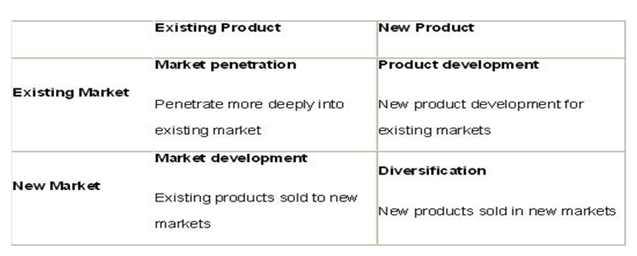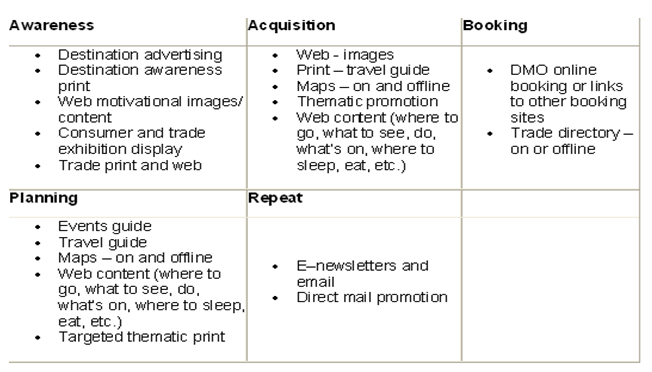Introduction
Destination management is the process or ways through which governments or industrial players conserve and improve tourist attractions. This includes not only tourist’s sites but also events. Industrial players include Destination Management companies popularly abbreviated as DMC. Destination Management Companies are companies that possess vast local knowledge, proficiency and resources.
They specialize in planning and implementation of tours, events, transport logistics and tour programmes logistics. DMC offers various services based on their local knowledge of the destination. The services offered ranges from excursions, gala nights, conference venues, accommodation, transportation and logistics.
As purchasing consortia, these companies are able to provide better rates. It is important to note DMCs offer only use of the already available products at a destination as they do not on it (Jonsson, 2008).
Destination marketing refers to the proactive and strategic approach to the financial and cultural progress of a location. It also refers to a visitor-centred approach that balances and cooperate interests of tourists (visitors), service providers, and the local community. Destination marketing is important and has given rise to Destination Marketing Organisations.
The purpose of these organizations is to promote the region and increase the visitor’s number (Richardson& Crompton, 1988). The organizations also promote development and implement marketing strategies.
Through their activities, these organizations or companies help in economic development of a region by increasing the number of visitors. In their regions, they act as the most valuable tool of marketing as they are directly responsible for the regions marketing.
The role of marketing has not been left only on these companies and organizations, but governments are key players in this through the various institutions they create and fund (Katrin, 2005). This paper will discuss destination marketing and destination management. It will discuss on ways of marketing and the continuing need for improvements.
Tourism destination marketing has now become a major component in destination marketing. In accordance to marketing articles, some researchers recognize destination marketing as strategically market-oriented and therefore a strategic advancement in placing development rather than an advertisement on fore front (Katrin, 2005).
Discussion
Continual marketing is needed to attract more visitors to an area. This need arises as visitors needs and wants keeps on changing. This can be attributed to various factors that affect consumers’ needs and tourism needs. In relation to this, there is a need to address factors that make people travel and how to motivate these people visit certain regions (Pavlovich, 2003).
It is crucial to note that tourism management is ineffective if tourists’ behaviour and decision making in relation to tourism products are not understood. This brings the need to study the tourist’s behaviour in relation to, the need, motives while buying and how they make their decisions associated to tourism.
Another study on impacts of various different promotional tactics and possible risk perception for tourism purchases should be carried (Brewer, 1978). Further studies should be made on the different markets based on purchase behaviour and how industry players can increase their chances on marketing success. Many things affect the way consumers or tourists buy different products.
These are dealt with in many different frameworks that include economics, sociology and psychology. Tourists’ decision making can be broken down into four factors. One is enigisers of demand, which includes forces that motivate a tourist to decide on where to visit or go on holiday.
The second factor is effector of demand. This is the factor that will affect the tourist’s perception and knowledge of a product thus increasing or decreasing the various energizers which will lead to the tourists’ action. The third is roles and the decision-making process and lastly the determinant of demand (Kozak, 2002).
Factors that affect consumers or tourists decisions can also be analysed from two perspectives. We have on one hand factors that influence the demand which include inspiration to travel and capability to travel (Ashworth & Voogd, 1990).
These factors include economic capability, political well being of a region to innovations in technology just to name a few. On the other hand, there are those emerging factors that will influence tourists. This will include destinations, expectation on quality, booking behaviour and many others.
These factors keep on changing and as the behaviour of the tourist changes there is a need to look into the future and try to predict some of these changes and their reasons (Kotler, Bowen & Makens, 1993).
Besides addressing the factors that affect people who want to travel, there is the need to understand reasons that make people travel. This approach will help in motivating more people to travel to various destinations.
When looking at motivation, we seek answers to reasons that make people leave their homes to visit other areas. Different things motivate tourists, and this has made it hard to predict how or ways of motivating different types of tourists. This complexity in travel motivation has been noted by Krippendorf.
Krippendorf said that travel is influenced by various numerous motivations which include regeneration and recuperation, social integration and compensation, communication, self-determination, broadening the mind, happiness and self-realization. Motivations are dependent also on factors such as family relationships, upbringing and education (Krippendorf, 1987).
It is thus of utmost importance to market a destination and motivate tourists to visit regions. A strategic approach should be on the onset of marketing planning, targeting of markets, product definition, choosing the right marketing media and campaigns implementations (Richins & Pearce, 2000).
There should be a strategic approach. This is done through identifying the advantages of partnership working, and employing of agencies to market the destination. In implementation, one should also identify what comes first that is the customer or the product. It has been proven that the best approach to do this starting with the product, familiarizing with the product, understand current visitors and why they visit.
They should also decide who else can be attracted to visit and finally plan how to get them. Another strategy should be that of growth. Organisations need a tool to help them in identifying whether to market new or existing products. One of these tools is Ansoff’s Matrix as shown below (Katrin, 2005).

Source: Adapted from Victor, Alan, Michael, & Ashok, (2009).
Discovering what is appropriate and important helps a marketer devote his resources wisely and formulate the right approach. The target group is also a key concept in destination marketing. Successful destinations have a clear policy on the persons they target.
This helps in the formulating of products and marketing strategies. In marketing a destination, one ought to look at several things like need for targeting tightly, choosing the target market, segmenting the market, and getting to know their consumers (Ashworth & Voogd, 1994).
There is also a need to identify the product that will be taken to the market. Under the identification of the product, several things need to be addressed. They include brands and how a place can be branded to appeal to tourists.
There is also need to identify the destinations and places that are going to be marketed. Besides identification of the product, there is a need to create themes, experiences, and events related to the product (Krippendorf, 1987).
There is also needs to formulate ways of reaching potential visitors for destination marketing to be successful. In addressing this, destination marketers identify the various methods, use, and their effectiveness in marketing. The method used- commonly referred to as – “marketing mix” – depends on communication channel the target market is most receptive, available finances, aim of marketing, and the message content.
Below is a table showing various market activities and collateral most appropriate to have influence on each stage of a tourist decision making and can be produced by marketers depending on target market (Jonsson, 2008).

Source: Adapted from Victor, Alan, Michael, & Ashok, (2009).
Conclusion
The execution of destination marketing has gone through numerous stages over the last few years. Organizations former focus on industrial growth has been complemented by a strong tactical concentration on destination marketing. The concept of destination marketing has been intrinsic though it is lately becoming more significant.
However, this is not considered as an inherent and contextual element of the role of destination marketing but as an additional role. Though the management role is attached in the tactics of the DMO, the degree of its execution has so far been restrained. This can be attributed to the difficulties that lead to uncertainties about the appropriateness of destination marketing as a tool for place management.
Research has shown that the efforts for influencing both the regional and global government continue being weak in such a way that the DMO’s influence is exemplified by guidance rather than an efficient and highly prominent involvement in the destination development procedure (Kozak, 2002).
References
Ashworth, G. J., & Voogd, H. (1990). Can places be sold for tourism? Marketing tourism places. Routledge: London.
Ashworth, G. J., & Voogd, H. (1994). Marketing of tourism places: What are we doing? Global tourist behaviour. New York: International Business Press.
Brewer, J. (1978). Tourism business and ethnic categories in a Mexican Town.Tourism and behavior (pp. 83-100). Williamsburg: College of William and Mary.
Jonsson, C. (2008). Does Nationality, Gender, and Age Affect Travel Motivation? Journal of Travel & Tourism Marketing, 25:3,398 — 408.
Katrin, B. (2005): Tourism destination marketing – A tool for destination management? New Zealand: Asia Pacific Journal of Tourism Research, 10:1, 45-57.
Kotler, P., Bowen, J. & Makens, J. (1993). Marketing for hospitality and tourism. Prentice Hall: Upper Saddle River.
Kozak, M. (2002). Comparative analysis of tourist motivations by nationality and destinations. Tourism Management, 23, 221-232.
Krippendorf, J. (1987). The holiday makers: Understanding the impact of leisure and travel. London: Heinemann-Butterworth.
Pavlovich, K. (2003). The evolution and transformation of a tourism destination network: New Zealand: Tourism Management, 24, 203–216.
Richardson, S. L., & Crompton, J. L. (1988). Cultural variations in perceptions of vacation attribute. Tourism Management, 9(2), 128-136.
Richins, H., & Pearce, P. (2000). Influences on tourism development decision-making: Coastal local government areas in eastern Australia, Journal of Sustainable Tourism, 8(3), 207–225.
Victor, T. C., Alan, F., Michael, M. & Ashok, R. (2009). Marketing in Travel and Tourism. Amsterdam : Butterworth-Heinemann